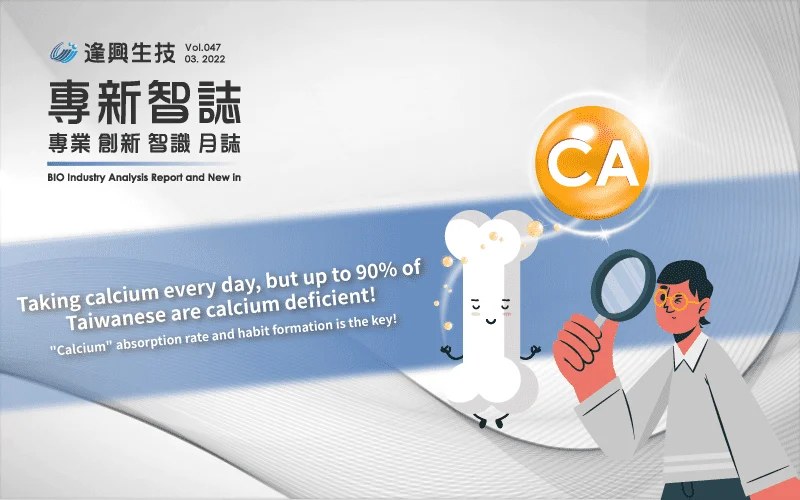
Many People Take Calcium Daily, But Up to 90% of Taiwanese Are Calcium Deficient! Calcium Absorption Rate and Habit Formation is the Key!

Calcium Supplementation Is Common,
But Why Do People Still Lack Calcium?
Calcium is a vital element in the body. As such, calcium deficiency is extremely detrimental to man’s health. It is generally known that calcium supplementation helps to improve calcium deficiency. However, despite the daily intake of calcium supplements in an attempt to increase calcium in the body, many still suffer from this deficiency because of a low calcium supplement absorption rate in the body.
According to “The Compendium of Materia Medica,” eating sesame seeds regularly can brighten the eyes, lose weight, and prevent aging. The nutritional benefits of sesame seeds, like being rich in calcium, have been recognized by traditional Chinese medicine for hundreds of years. For those who are deficient in calcium, a spoonful of black sesame seeds can be added to milk to enhance calcium absorption.
Calcium needs by age vary, and calcium absorption in the body declines with age. So, middle-aged and older adults in the west are still prone to osteoporosis. Westerners have always advocated sunbathing and a diet rich in calcium, so their physiques and bones are generally more robust than easterners.
Calcium supplementation has drawn attention for a long time, and it’s especially important for modern people with an unbalanced diet. Calcium deficiencies can affect all parts of the body and may lead to conditions like fatigue, cramps, rough skin, blurred vision, tooth decay, and others. For instance, the women’s hormone estrogen declines during menopause, which affects intestinal absorption of calcium and sleep quality. So, small conditions caused by calcium deficiency should never be ignored.
Many may not find it practical to meet the recommended daily intake (RDI) of calcium from diet alone due to its poor absorption rate. In addition, most people can hardly get into the habit of taking dietary supplements regularly. Studies show that 90% of people do not consume enough calcium. The target market for calcium supplements includes three major groups[1]:
- Growing children who need calcium to build strong bones; menopausal women.
- Middle-aged and older adults facing the risk of osteoporosis; and
- Pregnant women supplementing for their babies’ bone development.
The global calcium supplement market is projected to be valued at US$ 8.01 billion by 2032, with Asia-Pacific leading the market and Europe following closely[2][3][4]. These statistics show the growing demand for calcium supplements.
[1] https://health.ettoday.net/news/1755601
[2] https://www.mordorintelligence.com/industry-reports/calcium-citrate-market
[3] https://www.transparencymarketresearch.com/calcium-tablets-market.html
[4] https://www.marketwatch.com/press-release/global-calcium-supplements-market-forecast-upto-202

Regular Calcium Intake Can Only Be Effective with a Better Absorption Rate.
A Friendly Dosage Form Helps Develop the Habit of Calcium Supplementation Naturally!
Calcium supplementation is not as easy as you think. Many people choose a diet rich in calcium, such as drinking a lot of milk or consuming dried fish, black sesame, nuts, beans, etc. Unfortunately, only about 30% of the calcium from food can be absorbed, and this absorption rate further declines with age. This makes calcium supplementation even more necessary as calcium needs by age differ.
Calcium-rich foods are not prevalent in daily meals, so it is difficult to consume the recommended daily amount. Furthermore, some plant-based foods we often eat, such as spinach, pumpkin, corn, etc., contain high levels of phytic acid and oxalic acid, which inhibit calcium absorption. With these factors at play, dietary supplements are a better option to get adequate calcium into the body. The ingredients often used in commercially available health foods are calcium algae, calcium carbonate, calcium citrate, calcium lactate, etc.
• Vitamin D3 helps the body absorb calcium and hold it to the bone.
• Vitamin K2 aids calcium conversion, prevents calcium solidification, and improves the use of calcium.
• Magnesium coats calcium in bones, inhibiting the activity of osteoclasts and preventing bone loss.
The elderly, children and menopausal women are counted as the three major groups most in need of calcium supplementation. However, in reality, the elderly often take a lot of medications and may refuse the offer to add to the existing list by swallowing dietary supplements. In addition, the capsule or tablet dosage form has the appearance of medicine; children will instinctively hate to take it, and busy office workers can easily forget to take it. The limited dosage forms are the major bottleneck in the palatability and absorption of calcium supplements. Thus, the way to improve the absorption rate is to develop a friendly dosage form that is tastier, more effective, and easier to take. Hence, this is the direction that health food suppliers are heading.




